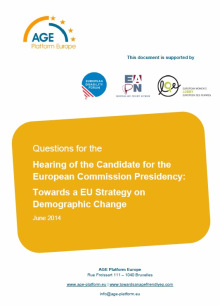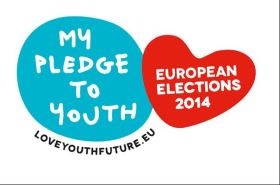Ahead of the election of the President of the European Commission tomorrow in Strasbourg, AGE Platform Europe calls on MEPs to check Mr. Juncker’s commitments to tackle positively population ageing. Demographic change, if addressed adequately by EU leaders, is a key opportunity to implement innovative solutions that will make Europe a better place to work and live and help the EU create new jobs and find sustainable solutions for our ageing population.
In 2012, there were 190 million people aged 50 years and over in the EU, up from 178 million five years previously, according to Eurofound. Huge impacts on Member States’ social security systems are expected in the coming years.
Demographic and climate changes are two major challenges facing Europe. They are also the two main areas where huge opportunities for economic growth, innovation and social justice can be developed in the coming decade if there is political will behind.
The next President of the European Commission will have a key role to play to reinforce the implementation of the Europe 2020 Strategy to ensure fair and sustainable growth and prosperity of European citizens at every stage of life. But for the moment the EU is lacking a coordinated approach to demographic change.
AGE calls on EU leaders to adopt an EU Strategy on Demographic Change to help coordinate and build synergies between EU policies on which demographic change have an impact. This includes the social dimension of the European Semester, the situation of fundamental rights, the realisation of EU citizens’ rights in the internal market and the implementation of the Structural funds.
In this framework, a EU Strategy on Demographic Change should become a main vector for economic growth and help EU Member States and regions adapt to the needs of their rapidly ageing populations in ways that are sustainable and fair to all generations and ensure equality between men and women. In other words, it will help create an Age-Friendly European Union.
Last week, we welcomed Mr Juncker’s recognition of the unfair social consequences of austerity measures and will carefully monitor his commitment to ensure social justice during this new term. Social assessments of reforms are key tools here to guarantee adequacy and sustainability of social security systems for all generations, regardless of their age and income.
The EU must also remain at the forefront in terms of protection of fundamental rights. This includes fighting against any form of age discrimination and we call on MEPs to question Mr Juncker on his willingness to develop all necessary tools to protect older persons’ rights in Europe, including via relaunching the stalled discussions on the draft directive on equal treatment outside employment.
AGE calls on MEPs to ask the right questions tomorrow in Strasbourg and invites them to read our proposals for questions here. These questions are backed by the European Disability Forum, the European Anti-Poverty Network, the European Women’s Lobby and the European Public Health Alliance.
Useful links:
AGE Manifesto for the European Elections 2014 (here)
AGE proposals for questions to the candidate President of the European Commission (here)
AGE recommendations to the new EU leaders (here)


